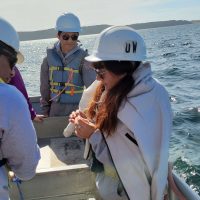Being a Scientist: Student Profile with Mollie Ball
Tell us some more about what brought you to the University of Washington?
I came from a small town in Virginia where a lot of kids didn’t go to college. As a non-traditional student, it took me a long time to get my AA. I moved around a lot and attended four different community colleges in three different states! Finally, in 2022, I was ready to transfer to a four-year university. I had finally settled down in Seattle and was coming from Bellevue Community College (now called Bellevue College). In my last year, I learned more about UW, and I knew it was the school for me. The academic rigor and research focus really appealed to me.

analysis.
My initial plan was majoring in Ecology Evolution and Conservation Biology. However, after joining the GEODUC program, which introduces transfer students to geosciences, I decided to add Marine Biology as a second major. The hands-on nature of the marine sciences program captivated me. Although I had always been interested in whales and other marine mammals, I hadn’t considered it as a field of study before. As a Marine Biology major and GEODUC participant, I have been able to meet staff and students from across the College of the Environment and learn more about what paths to take to get into research (plot twist- you can be you AND a scientist!!).
What has been a highlight of your time so far in the program?
After taking some SAFS classes which counted towards my Biology major, I realized it wouldn’t work for me to just take some classes – I needed to do the full thing. I was hooked! The highlights for me so far have been all of the research experience offered by Marine Biology and in the wider College of the Environment. I have worked with Dr. Amy Van Cise in her Whale and Dolphin Ecology Lab doing acoustics and I’m starting a genetics project with her that I’m very excited about. This hands-on research is a definite highlight.
The opportunity to go up and visit FHL as part of the Mar Bio 488 ‘Marine Biology in the Field’ class was another highlight. Working with Dr. Sasha Seroy and Dr. Jose Guzman and conducting my own research project really made me feel like a scientist. I feel like I’m a better researcher, I have a clearer understanding of what a researcher is, I know what questions to ask and feel more confident in my abilities. There are so many amazing opportunities in the Biology program, but the faculty and staff in the College of the Environment really drive students to be the best of whatever thing you want to be, and for me, that has helped me reach for bigger things than I ever thought!

What has it been like being a transfer student?
It was definitely overwhelming when I first got to UW, especially as an older student. You meet a lot of people and a lot of events are on offer, but I didn’t really feel like I belonged, especially with some of the RSOs which are not necessarily geared towards older students. Things like living further away from campus can be a barrier to attending events taking place later in the day. But what really turned this experience around for me was being part of the GEODUC program. GEODUC really brought me community, and a community I’ve been able to build off of. I have made life-long friends through this experience, and we support each other through this hard and twisty academic adventure that a lot of us are experiencing as first-generation students. That support has been indispensable.
Being a transfer student, I would say it is an opportunity to focus on what you’re here for. I spent a lot of my younger years traveling around the US – trying out new jobs, meeting different people – and when I came to UW, I was ready to double-down and focus on getting research experiences, doing well in classes, and feeling comfortable with the material I was being taught.
I have also really benefited from doing a double major. Not just for the breadth of knowledge but being able to stay here for a third year versus only being here for two years then leaving. Some things you just can’t do in only two years!
What’s next once you graduate?

I will be graduating in Spring 2025, so not too long to go. As of a week or so ago, I decided to apply for the National Science Foundation (NSF) Graduate Research Fellowship Program (GRFP) for a master’s program at SAFS. I would be using genetic metabarcoding on fecal samples, which is in a way similar to my work with Amy Van Cise. I had always considered grad school, but didn’t feel ready until completing MARBIO 488. I had some research experience, but that class gave me the confidence and tools that I will need in graduate school. So that’s my 2–3 year plan and I’m excited to continue being a researcher.
Any final words of advice for other undergraduates in the Marine Biology major?
If I could give a piece of advice, it would be to meet as many of the amazing people in SAFS and Marine Biology that you can! I learn so much about academia even in just casual conversations with the people that work for the College of the Environment. Specifically, the SAFS Seminars which are held every Thursday are a great way to learn what research is being conducted right here and you can meet the people doing it- a lot of times they are your professors!